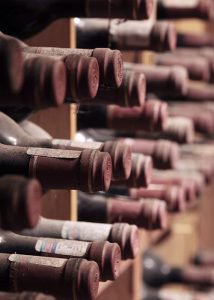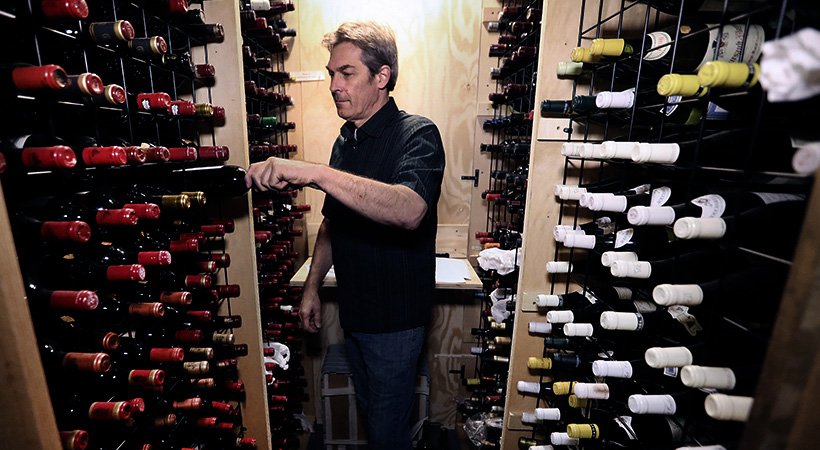Stay abreast of COVID-19 information and developments here
Provided by the South African National Department of Health
Corked or creamy:
should you invest in wine?
If local wines are fetching top prices at auction, does it follow that wine makes a good investment? Sceptics and believers weigh in on the debate.
Henré Hablutzel sits in an air-conditioned office surrounded by cases of Thelema, Hartenberg, Sijnn and Kanonkop – all iconic South African reds. The wine, he says, stretching like a cat in his old leather chair, is just the overflow from his collection at home. He and his wife have downscaled and his cellar is now confined to an air-conditioned bedroom occasionally shared with his grandson.
Hablutzel, an auctioneer with a passion for wine, has been conducting the Cape Winemakers Guild (CWG) Auction for 19 years. He has been collecting wine for longer but doesn’t call himself a wine investor. ‘I drink my wine – always red and always more than 10 years old.’

He says he doesn’t sell it because there’s no market for private (secondary) wine sales in South Africa. This seems an extraordinary statement from a man who at last year’s auction sold a six-bottle case of Kanonkop CWG Paul Sauer 2013 for R13 400 and a case of Rust en Vrede CWG Auction Estate 2013 for R12 600.
‘These are once-off wines produced in small quantities for this event by the best winemakers in the country. You know what you’re buying and how it has been cellared. When you’re buying wine privately you have no idea of its history. Even the best wines badly cellared will not age well.’
Over the years, it has become apparent that South Africans appreciate fine wines, Hablutzel says. The CWG Auction, which attracts big commercial buyers such as Tsogo Sun, The Butcher Shop & Grill and Hong Kong’s Crown Wine Cellars, now has more individual buyers than commercial.
However, Wendy Appelbaum, owner of DeMorgenzon wine farm, doesn’t see South African wine as a great investment – yet. ‘We’ve been around since Bordeaux was drained but we’re not valuing our wines correctly. It’s about cellaring and space. When you’re selling wine at R1 500 or R2 000 a bottle, that’s a lot of space for little noise,’ she says.
Whether we change the culture is in our own hands, she adds, but there’s little doubt that within a few years South Africa will regularly be making some of the best wines in the world.

Marc Russell, a Canadian wine collector and founder of The Fine Wine Reserve, stands among some private wooden wine-storage lockers popular in Toronto, due to condo living and the lack of space. (Richard Lautens/Toronto Star via Getty Images)
Globally prices for fine wines have climbed to their highest levels since the crash in wine prices in October 2011 (after the Chinese stopped buying in huge quantities), which saw the Bordeaux Index, launched in 2008 at 100 points, fall from 150 points to 110 points. However, the index has shown some stability since 2014/15.
There’s a fear that equities, which are close to record highs, cannot sustain their climb, so investors in wine funds are viewing wine much like gold – as a store of value in uncertain times.
‘Favourable macroeconomic conditions, constrained supply and robust demand will continue to drive the market,’ says Chris Smith, an investment manager at the London-based Wine Investment Fund. The fund returned 17% in 2016, boosting its net asset value to £248 million.
Roland Peens, founder of The Wine Cellar, which sells local and imported wine and offers investors and collectors a cellaring service, believes South Africa will catch this tailwind.
‘South African wine producers don’t produce in high quantities and older vintages are increasingly rare and expensive,’ he says. ‘Demand for South African fine wine is at an all-time high.’
Last year, DeMorgenzon’s The Divas Chenin Blanc was named as one of the three ‘most exciting wines of the 21st century’ and profiled at Wine Spectator’s New York Wine Experience.
Respected wine critic Michael Fridjhon is also wary of buying local wine as an investment. ‘At the moment South African wine is not a good investment,’ he says. ‘There’s no proper secondary market, resellers can’t claim VAT back, it’s not easy for private buyers – who by definition wouldn’t have a licence – to sell legally.
‘There’s also a belief that our production is getting better every year, so old wine is like an iPhone 4.’
ON SOUTH AFRICAN WINE AS AN INVESTMENT
South Africa boasts world-class wines that can compete with their international peers. International wine buyers also appreciate the quality of South African fine wines.
The biggest difference between these wines and their international counterparts is the massive discrepancy in price. One can buy a top-end South African Bordeaux blend for under €50, whereas a French Bordeaux blend with similar characteristics can easily fetch €100 or more. I believe the gap will narrow as the world recognises the quality of South African fine wines.
ON THE PROPOSED SA WINE INDEX
It would be great to have wine as an investable asset class for investors. Currently the costs of storage and the risk of no secondary market mean it’s difficult to make a case for wine to be part of an investment portfolio.
The index might provide the opportunity of a controlled market for wine investors to exchange trade and this would potentially increase the liquidity from an investment perspective. It’ll also allow investors to invest in certain wines, an opportunity that’s rarely available in the secondary market.
Riaan Gerber, Investment Analyst at Sanlam Private Wealth
Using your equity portfolio to secure credit allows you fast access to capital.
Sizwe Mkhwanazi has spent 14 years in Investment Management.

Have a question for Sizwe?
South Africa
South Africa Home Sanlam Investments Sanlam Private Wealth Glacier by Sanlam Sanlam BlueStarRest of Africa
Sanlam Namibia Sanlam Mozambique Sanlam Tanzania Sanlam Uganda Sanlam Swaziland Sanlam Kenya Sanlam Zambia Sanlam Private Wealth MauritiusGlobal
Global Investment SolutionsCopyright 2019 | All Rights Reserved by Sanlam Private Wealth | Terms of Use | Privacy Policy | Financial Advisory and Intermediary Services Act (FAIS) | Principles and Practices of Financial Management (PPFM). | Promotion of Access to Information Act (PAIA) | Conflicts of Interest Policy | Privacy Statement
Sanlam Private Wealth (Pty) Ltd, registration number 2000/023234/07, is a licensed Financial Services Provider (FSP 37473), a registered Credit Provider (NCRCP1867) and a member of the Johannesburg Stock Exchange (‘SPW’).
MANDATORY DISCLOSURE
All reasonable steps have been taken to ensure that the information on this website is accurate. The information does not constitute financial advice as contemplated in terms of FAIS. Professional financial advice should always be sought before making an investment decision.
INVESTMENT PORTFOLIOS
Participation in Sanlam Private Wealth Portfolios is a medium to long-term investment. The value of portfolios is subject to fluctuation and past performance is not a guide to future performance. Calculations are based on a lump sum investment with gross income reinvested on the ex-dividend date. The net of fee calculation assumes a 1.15% annual management charge and total trading costs of 1% (both inclusive of VAT) on the actual portfolio turnover. Actual investment performance will differ based on the fees applicable, the actual investment date and the date of reinvestment of income. A schedule of fees and maximum commissions is available upon request.
COLLECTIVE INVESTMENT SCHEMES
The Sanlam Group is a full member of the Association for Savings and Investment SA. Collective investment schemes are generally medium to long-term investments. Past performance is not a guide to future performance, and the value of investments / units / unit trusts may go down as well as up. A schedule of fees and charges and maximum commissions is available on request from the manager, Sanlam Collective Investments (RF) Pty Ltd, a registered and approved manager in collective investment schemes in securities (‘Manager’).
Collective investments are traded at ruling prices and can engage in borrowing and scrip lending. The manager does not provide any guarantee either with respect to the capital or the return of a portfolio. Collective investments are calculated on a net asset value basis, which is the total market value of all assets in a portfolio including any income accruals and less any deductible expenses such as audit fees, brokerage and service fees. Actual investment performance of a portfolio and an investor will differ depending on the initial fees applicable, the actual investment date, date of reinvestment of income and dividend withholding tax. Forward pricing is used.
The performance of portfolios depend on the underlying assets and variable market factors. Performance is based on NAV to NAV calculations with income reinvestments done on the ex-dividend date. Portfolios may invest in other unit trusts which levy their own fees and may result is a higher fee structure for Sanlam Private Wealth’s portfolios.
All portfolio options presented are approved collective investment schemes in terms of Collective Investment Schemes Control Act, No. 45 of 2002. Funds may from time to time invest in foreign countries and may have risks regarding liquidity, the repatriation of funds, political and macroeconomic situations, foreign exchange, tax, settlement, and the availability of information. The manager may close any portfolio to new investors in order to ensure efficient management according to applicable mandates.
The management of portfolios may be outsourced to financial services providers authorised in terms of FAIS.
TREATING CUSTOMERS FAIRLY (TCF)
As a business, Sanlam Private Wealth is committed to the principles of TCF, practicing a specific business philosophy that is based on client-centricity and treating customers fairly. Clients can be confident that TCF is central to what Sanlam Private Wealth does and can be reassured that Sanlam Private Wealth has a holistic wealth management product offering that is tailored to clients’ needs, and service that is of a professional standard.